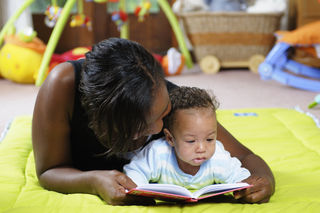Neuroscience
The Magic of Reading Aloud to Babies
New research shows even infants benefit from books and reading.
Posted May 5, 2017 Reviewed by Ekua Hagan

You’re never too young for books. Reading to babies as young as six months of age leads to stronger vocabularies and better early literacy skills four years later, just as the children are getting ready to go to school.
That’s the finding being presented at the Pediatric Academic Societies Meeting on May 8. How often and how vividly kids and adults engage in books together through the toddler years also mattered, predicting early reading and writing skills.
“Even though children may not be talking yet, that doesn’t mean they’re not learning,” says developmental psychologist Carolyn Cates, a research assistant professor in the department of pediatrics at NYU Langone Medical Center and lead author of the study.
The early language acquisition stakes are high. Previous work has already shown that children’s literacy skills when they start school correlate to later reading success. According to the American Academy of Pediatrics, one in three children starts kindergarten without the necessary foundational literacy. Reading rates by third grade are the best predictor of high school graduation, but alarmingly, two-thirds of children in the United States, and 80 percent of those below the poverty line fail to develop reading proficiency by third grade.
In the new study (as yet unpublished), Cates and her colleagues wanted to know: “How early is book reading important?” The researchers followed more than 260 parent and child pairs from birth to school entry. When the children were 6, 14 and 24 months old, parents reported on how often they read together and how many books they had in the house—measures of the quantity of shared book reading. They also reported on the quality of that reading—whether they talked about the book, pointed to pictures, discussed the emotions and characters in the story and so on.
After adjusting for socioeconomic differences and other confounding variables, the researchers found that the quantity and quality of book reading in early infancy predicted the size of a child’s vocabulary and early reading skills (quality was most important). Both quantity and quality of book reading in the toddler years predicted early literacy skills like name writing, beginning sound awareness, and early reading skills.

These findings fit neatly with what we know about early language development. Reading aloud is a form of conversation and conversing with children matters.
In 1995, a landmark study by researchers Betty Hart and Todd Risley found that, in the first three years of life, some children heard 30 million more words than others, an advantage that translated by third grade into bigger vocabularies, better reading skills, and higher test scores.
More recently, Dr. Dana Suskind, a pediatric surgeon and founder and director of the Thirty Million Words Initiative at the University of Chicago, wrote a wonderful book updating this research. (Read more about her book here.)
As I have reported before, we now know that early language exposure significantly affects the way language networks are built in the brain. Psychologist Anne Fernald of Stanford University has shown that “a child’s mental processing speed ... is shaped through rich engagement with language.”
Speedier processing allows babies and toddlers who recognize familiar words to pay closer attention to the next word in the sentence. Those kids get more out of each verbal experience, boosting vocabulary, and strengthening working memory, reasoning, and conceptual abilities.
Reading to young children is an easy and obvious way to expose them to language. It expands their vocabularies—you don’t have to go to the zoo, for instance, to talk about camels and elephants.
And reading gives parents something to talk about. Those who feel shy or silly talking about the everyday world to a nonverbal child can pick up a book and instantly launch into lively language.
Furthermore, the rhythm, repetition, and rhyme of children’s books help lay down the neural networks kids need for reading. (Read more about the neurobiology of Dr. Seuss here.)
Nonetheless, a national survey found that only 60 percent of parents in middle-class families read to children every day. In poorer families, the number was only 34 percent. And many adults assume that children under one are too young for reading. Of the families in Cates’ study, when the babies were six months old, fewer than 20 percent were reading more than five days a week, and more than 50 percent were reading, at most, three days a week.
Cates hopes that her study will strengthen support for parent training programs like the one at NYU Langone run by Dr. Alan Mendelsohn, or Reach Out and Read, which provides books to families during doctor visits. But more broadly speaking, her work reminds us that reading aloud, early and often, really does have the power to transform young minds and young lives.
References
Cates, Carolyn Brockmeyer, Adriana Weisleder, and Alan L. Mendelsohn. "Mitigating the effects of family poverty on early child development through parenting interventions in primary care." Academic pediatrics 16.3 (2016): S112-S120.https://www.ncbi.nlm.nih.gov/pubmed/27044688
High, Pamela C., and Perri Klass. "Literacy promotion: an essential component of primary care pediatric practice." Pediatrics 134.2 (2014): 404-409.http://pediatrics.aappublications.org/content/134/2/404.long
Hart, Betty, and Todd R. Risley. Meaningful differences in the everyday experience of young American children. Paul H Brookes Publishing, 1995. http://Hart, Betty, and Todd R. Risley. Meaningful differences in the everyday experience of young American children. Paul H Brookes Publishing, 1995.




